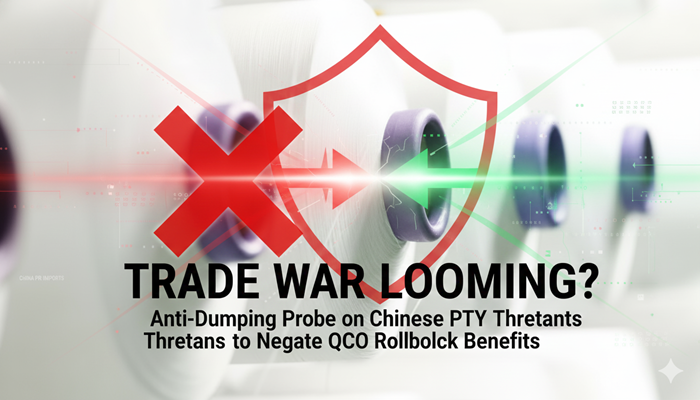
Just days after the Indian government withdrew Quality Control Orders (QCOs) on Polyester Textured Yarn (PTY) and other textile inputs to boost the cost-competitiveness of the downstream industry, the Directorate General of Trade Remedies (DGTR) has initiated a fresh anti-dumping investigation into PTY imports originating from or exported by the People's Republic of China (China PR). This immediate counter-move by the domestic PTY manufacturers, led by industry giants, sets up a direct conflict that could see the benefits intended for India’s exporters completely nullified by new protective duties.
The Core Conflict: QCO relief vs. Anti-Dumping protection
The recent withdrawal of QCOs on PTY was hailed as a significant relief by the downstream textile sector (garment and home textile manufacturers).
● QCOs impact: Previously, QCOs mandated BIS certification, which was a time-consuming and expensive process, especially for foreign suppliers. This restricted supply and pushed domestic PTY prices 15–30% above global benchmarks, hurting the export competitiveness of Indian textiles.
● QCO rollback goal: The rollback was intended to ease regulatory burdens and allow manufacturers access to raw materials at internationally competitive prices, improving their standing in the global Man-Made Fibre (MMF) market.
However, domestic PTY producers (the upstream industry) are now fearing a surge in aggressively priced imports from China, a global leader in PTY manufacturing, following the removal of the QCO protection. The new anti-dumping probe is a direct response to this threat.
● Anti-Dumping allegation: The applicants, including Reliance Industries Limited and Wellknown Polyester Limited, allege that PTY from China PR is being dumped in the Indian market at prices below its normal value, causing material injury to the domestic industry.
● Injury evidence: Prima facie evidence accepted by the DGTR shows that imports have increased significantly in volume (absolute and relative terms) during the Period of Investigation (POI). The domestic industry is reportedly experiencing price suppression/undercutting, financial losses, cash losses, and a negative return on capital employed.
DGTR's Prima Facie Findings
"The applicants are in losses and are incurring cash loss. Further, the applicants have earned a negative return on capital employed.", mentions DGTR Initiation Notification, citing the applicants' injury claim. The DGTR initiation notification, dated November 20, 2025, outlines the foundation of the investigation:
● Product Under Consideration (PUC): Polyester Textured Yarn (PTY), also known as Drawn Textured Yarn (DTY), classified under HS Code 5402 33 00. Exclusions include PTY made from non-PET materials like nylon, polypropylene, and polyethylene.
● Subject Country: China PR.
● Period of Investigation (POI): April 1, 2024, to June 30, 2025 (15 months).
● Basis of Dumping: Since China PR’s costs and prices may not be market-driven, the DGTR, for initiation purposes, determined the Normal Value based on the export price of PTY from a third country (proposed as Singapore to India).
● Dumping Margin: A comparison of the Normal Value and the Export Price (based on DG Systems data) showed a dumping margin that is above the de minimis level and significant, providing sufficient prima facie evidence for initiation.
Will the QCO removal impact be negated by Anti-Dumping Duty?
The benefits of the QCO rollback for the downstream industry are highly likely to be negated if the DGTR recommends, and the Ministry of Finance imposes, a definitive Anti-Dumping Duty (ADD).
The goal of the QCO removal was to lower input costs, while the goal of the ADD is to impose a duty that raises the price of dumped imports up to the "normal value" or to an extent that eliminates the injury to the domestic industry. If a duty is imposed, it would effectively re-introduce a price barrier on Chinese PTY imports, driving up the raw material costs for downstream Indian manufacturers, thus undoing the competitiveness gains achieved by the QCO withdrawal.
Challenges & future plans
The immediate consequence is a fierce trade policy debate pitting the upstream producers against the downstream exporters.
|
Stakeholder |
Perspective & Plan |
Challenge to Trade Policy |
|
Upstream Domestic PTY Producers (e.g., RIL, Wellknown) |
Seek ADD to eliminate unfair price injury from Chinese imports, safeguard market share, and restore profitability/return on capital. |
Risk making PTY uncompetitive again for downstream exporters, potentially forcing them to use inferior domestic substitutes or curtailing exports. |
|
Downstream Textile Exporters (Garments, Home Textiles) |
Want open imports at global prices (benefit of QCO rollback) to boost global competitiveness and achieve India's textile export targets. |
Face the challenge of increased input costs if ADD is imposed, which negates QCO benefit and jeopardizes their global price competitiveness. |
|
Government/DGTR |
Must balance the protection of the domestic PTY manufacturing industry (upstream) from dumping against the need to ensure low-cost raw materials for export-intensive sectors (downstream). |
The two trade remedy actions (QCO rollback and ADD initiation) appear contradictory, creating regulatory uncertainty in the polyester value chain. |
The DGTR has invited all interested parties, including exporters, importers, and the Chinese government, to submit information and comments on the scope of the PUC and PCN methodology within strict deadlines. The final recommendation will determine if India prioritizes domestic PTY manufacturing protection or the broader, export-oriented downstream textile value chain.












